Fifteen years after Portland introduced commercial carsharing to North America, Portlanders are continuing to show how businesses that enable occasional car use can fit into a modern multimodal city.
Since car2go launched in Portland in 2012, it’s steadily grown its local fleet from 250 to 530 cars, the largest in the country for any single city and the largest in North America in cars per square mile of home area — 10.2.
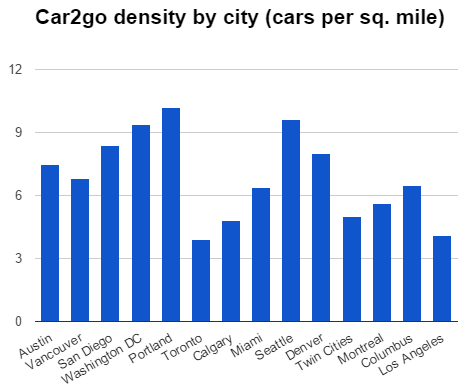
(Data source: car2go)
That’s according to data shared by car2go Tuesday in response to a BikePortland request. It’s current as of October 2014.
Following Portland in cars2go per square mile are Seattle (9.6 cars per square mile) and Washington DC (9.4). The continent’s lowest ratio is 5 cars per square mile in the Twin Cities, but that may be related to the company’s July 2014 expansion into St. Paul.
Car2go’s history in Portland
Portland was the fifth North American city to get car2go, following Austin, Vancouver, San Diego and Washington DC. Car2go remains the largest “floating-fleet” operator in the country, meaning that its two-seater vehicles can be picked up or dropped off anywhere within a designated home area. Parking, gas and insurance are included in the price of rental, which is currently 41 cents per minute up to $14.99 per hour.
Advertisement
Last month, the company chose Portland as the test city for its new bike racks, an experiment that we reported is being rigorously tested by local bicycle experts:
But in all seriousness, why has car2go chosen to offer so many cars in Portland? This is especially unusual considering that after almost three years of gathering members, Portland has the second-smallest car2go member base per car on the continent:
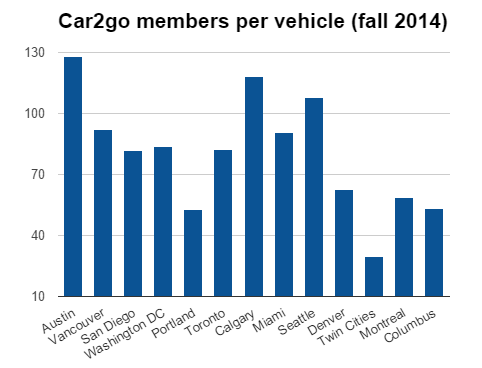
Two theories for car2go’s local success
The density of cars2go in Portland, despite the small member base, suggests that the service has a particularly dedicated base of users here. Here are a couple possible reasons:
Portland lacks Uber or Lyft service. As we’ve reported, ridesharing companies Uber and Lyft have decided not to start operating in Portland because of its unusually strict penalty — jail time — for operating an unlicensed taxi. Portland is one of only a handful of major cities where neither service is available. With these fairly similar services growing rapidly in other cities, car2go might be focusing its resources in Portland in order to capture market share while it can.
The best bike cities are also the best car2go cities. Portland and DC are the No. 1 and No. 2 large U.S. cities for bike commuting; Seattle is No. 6.
“A rising tide of car-lite residents lifts all alternative modes,” wrote Steve Gutmann, a local entrepreneur who’s worked for Carshare Portland, Flexcar and Getaround, in an email Tuesday. “I think it has everything to do with having lots of options that facilitate car-free and car-lite lifestyles. I think that Uber would further accelerate the trend.”
Though there are lots of factors involved here — and the low car2go density in the bike-friendly Twin Cities is a point against this theory — here’s an interesting chart shared this summer on the website of Dave Brook, the local entrepreneur who helped get the carsharing business rolling when he founded Carshare Portland in 1998. It’s a map of the roles different modes play in a city’s transportation network:

The image suggests that one-way carsharing like car2go works well in the same urban context as biking and walking (for trips of similar distance, that is) without competing much with them (because it’s more “flexible”). I’m not sure this captures my own experience, but it’s an interesting way to think about low-car life — and a plausible explanation for why Portland is leading the continent in one-way carsharing as well as biking.
Update 11:15 am: Brook writes to add another theory: Portland might have an unusual number of small car-free households with some disposable income living in the central city. “Probably a high concentration of the right demographic users within the Home area,” he writes. “It seems likely they would be the right demographic for bikesharing, as well.”
Also, reader Ryan H. shares the news that Seattle caps its car2go fleet at the current 500, but that it’s discussing raising that limit to 750 if companies agree to serve outlying areas as well. BMW and Zipcar are also looking to enter the Seattle market with car2go-like services.
Correction 11:40 pm: An earlier version of this post misstated the order of cities in which car2go launched.



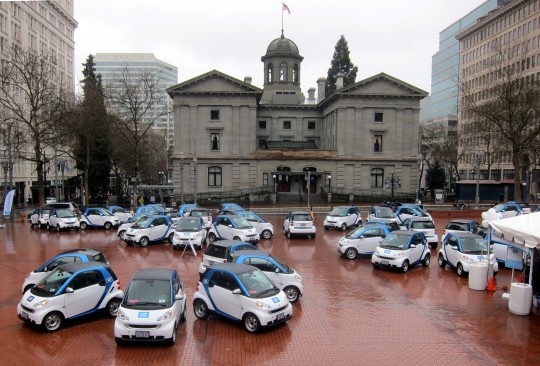
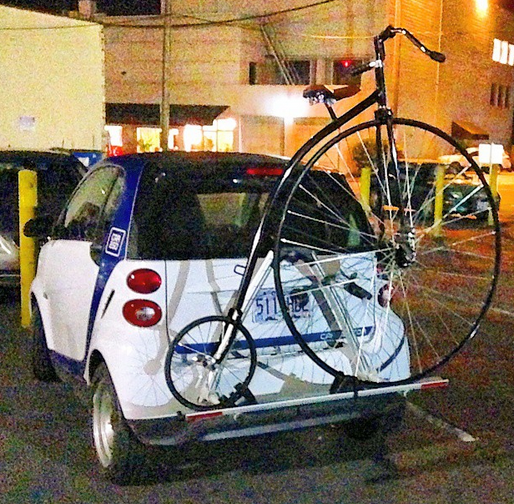
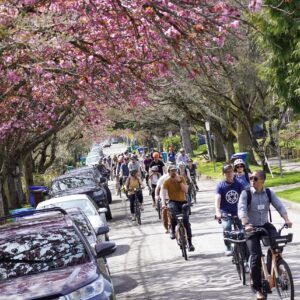

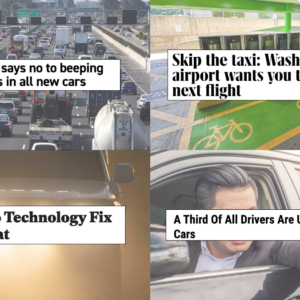

Thanks for reading.
BikePortland has served this community with independent community journalism since 2005. We rely on subscriptions from readers like you to survive. Your financial support is vital in keeping this valuable resource alive and well.
Please subscribe today to strengthen and expand our work.
“This is especially unusual considering that after almost three years of gathering members, Portland has the smallest car2go member base on the continent.”
That’s not what that graph actually says. The graph is set as “members/vehicle”. So if we have a higher number of vehicles than other cities, that number would go down (even if our member numbers were the same). You cite that we actually do have the highest number of vehicles of any city. Thus it would make sense that the ratio of members:vehicles would be lower.
Good stuff though. I actually used my membership for the first time last week (free minutes).
Good point, davemess – I edited. (And obviously it should also have been “second-smallest” – also fixed.)
I was going to say the same thing. Of course, if Portland has more car2go cars, that graph would show a lower car to member ratio.
Well, if that were the case, the two bar charts would look like mirror images of each other. Instead, aside from a few outliers like Austin and Calgary, the charts look fairly similar. More members per car seems to usually translate to more usage per car, which presumably translates to more cars per square mile of home area as the company tries to fill the existing demand. But not in Portland, where other factors seem to be more important in driving usage per car and, therefore, cars per square mile.
maybe you could do a scatter plot with # of cars and # of members to illustrate this point
Great stuff in this post. I’m a bit surprised to hear that Portland has the highest density of cars per square mile.
After all, there are huge chunks of the area during major parts of the day that have no cars within walking distance. The area bounded by MLK and 39th, NE Broadway and Fremont is usually empty of cars from 10am to 5pm. A very difficult situation for those of us in inner NE who replaced our second car with Car2Go, esp when biking isn’t an option.
I suppose the explanation must be heavy usage. Maybe you could ask them for a chart withmiles or minutes per member. That would complete the picture above.
We have a pretty compact city (and a good bit of the city isn’t currently serviced by car2go) and the highest number of cars. So both parts of that equation give you the result.
you can sign up for car2go for free + 30 minutes drivetime right now
http://www.car2gotime.com/
And you’d be a fool because their cars barely work because they refuse to connect to their rental network no matter where you’re parked, their customer service representatives are horrible and can’t help at all, and you’ll soon realize that taking the bus is faster and cheaper.
Car2go is a mistake even if you’re car free. The only positive I take away from my Car2go membership was it forced me to ride more because their cars are constantly inoperable.
And maybe tell the people who drive them to mellow the hell out! They may be small, but that doesn’t mean they won’t hurt when they hit me. They are second only to Fiat and Mini Cooper drivers these days on my list of people who annoy me most while I’m riding.
Hands down still BMW drivers!
BMW…and Mercedes .
You are being charged by the minute.
Maybe a flat first 30 minutes would be better.
Yes. Paying by the minute provides incentive to speed, and I too see very bad driving in these little cars. Lots of speeding, fast lane changes without signalling, red light running, etc. [Oh, I’m describing many drivers in general!].
With all the GPS feedback, one would think that Car2go can monitor bad driving and warn drivers … and ban repeat offenders.
And give them the ability to charge by the mile and not the minute.
Bill, they do–there’s an “eco score” that records one’s driving profile for that trip. If it dips too low, it warns and notifies that membership may be canceled if that behavior continues.
Thanks, I was wondering what that was for.
Hmm, I’ve never seen a membership cancellation warning when it comes up, I just notice that it pops up when I’m trying to accelerate fast enough to get onto the freeway because these li’l buggers are so weak 🙂
yeah it definitely creates a “race against time” mentality when using carshare, and with zipcar it’s almost worse because if you are running late and return it past due, zipcar fines you $75.
Nope. Minivans are still the biggest menace.
Anecdotal, but I agree as well. It seems like every other one is a manic behind the wheel.
That’s strange, because I’ve used it maybe 10 or so times now and never once had any of the problems you’ve mentioned, and find it to be a very useful option when I need to use a car for a short trip.
I have used car2go dozens of time and only once had trouble connecting, and that issue was solved with a phone call.
They have recently eliminated the chance of that ‘glitch’ affecting you from being unable to end your trip by implementing a feature where you click the button on the screen inside the car to end the trip, put the key away, get out of the car, close the doors, and then a 15-second countdown begins before the car automatically locks and your rental period ends. No more issues with lack of cell service! 🙂
Dan M.-
Interesting. When did you give up on them?
I had a few problems when they first launched, but I’ve used the service at least 25 times in Portland, Seattle, Minneapolis, Vancouver BC and San Diego, and my wife uses it once a week her in Portland. After they got the kinks out (which took a couple of months), we never had any sort of technical problem.
We used to sometimes have to walk a ways to get a reserved car, but with the boost in supply that problem has mostly gone away.
I tried to sign up for the service twice and could not due to technical glitches. I’m sure there are many others like me who just gave up.
I just wish there was a way they could fix the gigantic signal black hole in North Tabor/Montavilla. If I take one home, I have to call customer service to end the rental. Every single time. There doesn’t seem to be a sweet spot unless I park a half-mile away.
Is this a cell phone tower service “hole”…that keeps the car from registering the reservation “end”?
This can happen in parking structures / car parks for any car sharing vehicle with the remote access feature…and no cell phone boosters in the garage.
I don’t know what the problem is. Both GSM and CDMA networks have good coverage where I am. I’m not sure how Car2Go connects when starting/ending rentals…but it drives me bonkers. I sent a polite email to the company, and not heard back. I brought up the issue when talking a rep to end a rental, and they aren’t able to give an answer.
Other than that, Car2Go is pretty awesome.
Car2Go now automatically ends your reservation when you put the key in – they just added it so there’s a 15 second countdown and you don’t need to swipe your card anymore, thank goodness! 🙂
thank you thank you! n
They *have* recently fixed that issue. See my reply above: http://bikeportland.org/2014/12/02/portland-car2go-capital-north-america-114155#comment-5930014
I think its funny that there are no car2gos beteween Hawthorne and Powell, according to the map. That is one of the densest neighborhoods in the city!
Well, wait awhile and there will be. You understand that Car2Go cars aren’t tethered to specific parking spaces like Zipcar, right?
Give it some time and check again. I use their app so set up a radius search near where I am if there aren’t any cars and I usually don’t have to wait long for a car to pop up nearby. The cars don’t usually stay in one place very long.
a number of the cars go downtown with the commuters in the morning.
I think it’s telling that this article does not mention environmental impact, because–let’s face it–Car2Go is still primarily single-occupant, fossil-fueled transportation. (And yes, I know they have a handful of electric cars.)
“Telling” of what, exactly Jeff?
I guess we just assume that our readers know the cars are powered by gasoline, therefore I didn’t think it was necessary to say anything about environmental impact. One of my core editing principles is to never insult the intelligence of you and other readers.
Telling that Car2Go is more of an economic solution than an environmental solution. I did not intend to suggest that you were insulting my or anyone’s intelligence. I guess I just find it a little curious to see coverage of a car-rental program on a bike-centric blog.
How is less cars overall on the road (and the fact that car2go cars are small and gas savers) not an environmental impact?
The non-electric Smart Fortwo gets 34 mpg city/38 mpg highway. This isn’t the high score by any means. However the geometry piece of taking up less space is important, especially when it comes to parking
I’m willing to bet that still is better on average than the personal car trips they replace.
>This isn’t the high score by any means.
that’s 1 mpg off the top combined mpg for any gasoline-powered vehicle sold today.
sadly, the all time high mpg gasoline-powered production vehicle was sold in the 90s and was a very nice car but a complete sales bust.
http://www.fueleconomy.gov/feg/noframes/10747.shtml
man I was totally off-base. Hybrids and EVs are the only ones beating it
No, it’s really not that good. My 2001 Toyota Echo routinely beats it, despite being much bigger and heavier and seating four (and always hauling multiple people). Shouldn’t a car that small and light get gas mileage at least 10 mpg better? If the Honda Civic from 20 years ago (someone posted here), and even the Chevy Sprint of 25 years ago are beating that, why is that? I refuse to believe that something Chevy (or even Suzuki, the manufacturer) was doing in the ’80s couldn’t be improved upon or even replicated. It’s not like they souped it up or gave it more power, for sure.
The ’04 Echo is rated at 30/38mpg. So that is actually worse than the Smart car.
Ratings and actual mpg are not the same thing.
The reason I’ve heard in the automotive industry is that there are more safety regulations, emission controls and accessories that make the high mpg’s of the 80s and 90s much harder to achieve. It’s certainly not a lack of demand or a decrease in technological sophistication.
Has is been shown that Car2Go has reduced the number of cars on the road? The article does not say that, so saying that Car2Go has done that is a presumption, unless you’re aware of a study that draws that conclusion. If we assume that any Care2Go trip simply displaces an equivalent trip that the driver would have made in a privately owned car, then the number of cars on the road at any given time would NOT, in fact, be reduced. And, if we assume that a Car2Go trip displaces what would have been a ride on a bike or public transportation, then Car2Go actually INcreases the number of cars on the road.
Hey Jeff-
According to research done by Susan Shaheen at UC Berkeley (look her up; she has studied the impacts of carsharing on transportation choices A LOT), a former car owner who gives up his or her personal car and uses carsharing services whenever they need a car typically drive 50-67% fewer miles per year than they did when they owned a personal car.
The environmental magic of carsharing is that every trip’s cost is “fully loaded,” so people only tend to use it when transit, walking and biking are inconvenient. Hence the reduced driving, emissions and impact.
Also, car-sharing’s land use impacts are profound. Because each carshare vehicle eliminates the space required by a dozen or more personally-owned cars, cities can reduce the overall % of urban land that’s used to store idle cars.
Youre right that car sharing doesn’t eliminate fossil-fuel use, but it makes “car lite” lifestyles much more broadly appealing. And it facilitates (by reducing parking congestion) urban density, which results in more local derives, walk ability, etc.
If you want more people to drive less, you should celebrate the fact that Portland is the nation’s “car sharing capital.”
Now THAT’s the kind of study I’m talking about. 🙂
Selling our family’s second car and replacing it with Car2Go has definitely meant that I ride my bike more often for non-workout trips. Of course, that’s mostly when I discover that there’s no Car2Go within a mile of my house (centrally located near Lloyd Center) and I have to quickly get somewhere.
Less snarkily, I’d say that car2go means higher awareness of multimodal options. Sometimes, car2go. Sometimes, bike, bus, or walk.
Would love it if they had a three seater.
Keep your eyes peeled for “Car2go Black.” Not sure when it’s coming, but my understanding is that it’ll add some larger cars to the mix.
I received a black card in the mail months ago and they said it was special but didn’t say why, just made it sound like I’d somehow attained an elite status (ugh, overuse of C2G!) and have not heard a peep from them since…
I would like it if they had a skinny one-seater, that I could use to filter through traffic jams as I do on a bike, but then, people might drive them through the bike lanes.
I think the clearest thing that car2go’s success in Portland indicates is that taxis are way too expensive and not available enough in this town
Perhaps the best part of the adoption of car sharing services by many in the Portland region is that it helps to get all those beater cars parked on the street that many of “us” used to keep for that one weekly or monthly trip to the store, etc. You can often identify them by the moss or the leaf debris near them. (I wish cities would enforce the time stays on residential streets…these periods of non use go up as drivers adopt other means of mobility until the point that they call OPB to tow their car away.)
This reduced pressure can then potentially be reallocated to bikeways, busways, infiltration bulbous, etc. in the end.
I remember reading in the early days of PDX Car2Go that the whole thing was a loss-leader for Mercedes, who made way too many of their Smart Cars to sell through dealerships, and was able to right-off the mistake by expanding the rental business way more quickly than they planned too otherwise. Anyone know what I’m talking about or can provide a link?
I guess another way to put my question is: Is Car2Go PDX profitable?
That C2G in Portland has a small member base that takes frequent trips I think results from what the article mentions (no Uber, no Lyft), what Brooke mentions in his addendum (the right demographic in the “Home” area, that is, people in those close-in neighborhoods), and what Allan mentions (taxis are expensive). I would add that buses/streetcars does not serve every area of town very well. Depending on where in town one is going, say North to certain parts of SE, getting there by public transit can be a pain (time-wise). So, if you have the disposable income, C2G would seem like a good option for getting somewhere. Conversely, in those cities where C2G does not have as dedicated a membership as Portland, perhaps it’s a mix of personal finances and better public transit, or Uber or Lyft, that presents other options.
Is Über cheaper than Car2go?
I have only used Uber once, but I just did a quick search, and it looks like a ride on Uber costs $2.20 as a base fare, plus $1.20 a mile, plus $0.26 per minute.
Car2go costs $0.41 per minute.
On the face of it, this seems a lot cheaper than a taxi, or an Uber, or a Lyft. After all, there’s no driver that has to be paid…
My take is that Uber, Lyft and traditional taxisare great for a different niche of trips: post-party, drunken rides home, rides to places where there’s no available parking (e.g. downtown, Division during the dinner rush, etc.), and trips for people who either can’t or don’t want to drive.
I’m not sure why someone who knows how to drive would use one of those services over Car2go. Unless, of course, there’s no Car2go nearby…
Hey, Steve, Uber’s pricing scheme is a little confusing, but the figures you’re looking at actually mean “$2.20 base fare plus $1.20 a mile OR 26 cents a minute, depending on how fast the car is moving.” (Uber switches to per-minute costs in slow traffic.) So car2go is cheaper, but not by all that much. (The exception is during high-demand hours when Uber rates jump sharply.)
Based on my conversations with regular UberX/Lyft users in other cities and the one Lyft ride I took in SF last month, I think there’s a big share of the population that’s willing to pay the extra $1.50 per ride or whatever in order to have a dramatically more pleasant user experience.
No five-minute walk to the closest car; no peering at your phone to hunt for the right block; no wait in the rain for the lights to blink; no keying your password into the lag-y touchscreen; no dealing with the meaningless notifications; no figuring out the weird jerky gear system; no praying that the car will successfully connect once you park; and maybe most importantly, no gocarting around town in a funny-looking vehicle.
Don’t get me wrong — I like car2go despite its flaws and use it at least monthly. And with UberX/Lyft, there’s a little hassle in figuring out the right car. But it’s like the difference between DOS and Macintosh or Walkman and iPod. If car2go is going to survive in an UberX/Lyft world, it had better be fighting tooth and nail to protect its price advantage, IMO.
“Portland was the fourth North American city to get car2go, following Austin, Vancouver and Washington DC.”
What about San Diego? Is the chart ordered by date of introduction or not?
My wife and I used Car2Go for trips where the outbound was done together, but the return was separate (e.g. we drove to a social function, but she left at a different time than me). Also, as a return trip from MAXing into downtown.
A friend and I used Car2Go exclusively for a trip to Austin last year. That was fun. It was significantly cheaper to do that than rent a car and try to pay for parking downtown (during a Formula 1 weekend).
The electric smart is awesome, but for all its cred, Portland’s public EV charging infrastructure is woeful and gasoline ones don’t need as much babysitting. San Diego’s fleet is 100% electric, if I recall correctly.
I drove a smart (gasoline) for a year, and I absolutely loved the heck out of it. I got 38 city/42 highway (down to SF and back). The transmission was terrible, but not *that* terrible in manual mode. The 2016 smart engine should have direct injection (and other engine improvements that come with a powertrain not introduced in the 20th century), which ought to up the fuel economy by more ems-pee-gee than one hand can count and a far better transmission, too.
One interesting thing to note: fuel economy for the Car2Go smarts might suffer slightly because the telematics system consumes electricity even while parked. Thus the alternator has to work harder to recharge the battery during all of those short trips. But hey, transportation efficiency is still better.
We looked up the new Car2Go Electrics yesterday online and they are $25K, almost $10K more than the base gasoline model…it was the downfall for us 🙁
Car2goBlack? Larger cars? That would be game changing in my opinion. I’m carless, and often wished for a car2go large enough to shuttle a group of teens back from a late night party.
Of course, better late night bus service would also do the trick, although we’re a long way from having a late night street environment that would make parents comfortable having their teen daughters ride the bus alone. Ridesharing may be the best solution for this particular situation.
In any case, Car2go as it exists now helps singles/couples get around the city, not families.
Here are some details, in a video. Auf Deutsch! Looks a lot like Zipcar, but with little black Benz station wagons.
https://www.car2goblack.com/de/DE/
I have a love/hate relationship with them for many of the reasons mentioned here – the cars are poorly maintained (half of them don’t have working volume control on the radios, and about half of them show existing damage at check-in), they drive terribly (crossing the Fremont Bridge is terrifying when there’s even a semblance of wind), the gas card has never worked, and the phone customer service is beyond horrendous.
That being said, they have made some improvements, with a big one being the cars automatically checking you out at the end (which I’m guessing is because half the time you’d be in your meeting or asleep or whatever and get a text 20 minutes later saying “you didn’t check out properly, go find the car and swipe the card again”, ugh!). I am glad they’re adding the bike rack feature as well but if I remember right it only holds one instead of two and I’d rather my husband be able to bike rather than jog alongside 🙂
The $50/day feature on weekends is great though and beats Zipcar fees by a long way (they only give discounted days from 7-7 on weekdays and it’s $60+). I got the black card in the mail months ago and so far it’s meant nothing. But I do love the ease of parking and not paying for parking – Zipcar should take note!
While I’d love to try Getaround, the fact that they require you have a Facebook account to register is totally inappropriate. So they get no business from us.
But yes, as someone else commented, these services downfalls and huge cumulative costs have returned us back to biking – and even the bus!
Dont forget that Portland happens to also be the headquarters of Daimler Trucks a division of Daimler, just like SMART and Car2Go.
I have found driving a Car2Go to be a miserable experience. That transmission can never decide what gear to be in.
Miserable is a little strong. The gear shifting is choppy but I think they are fun to drive.